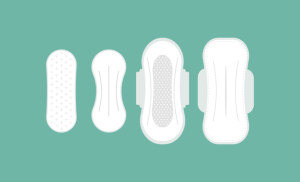Are you dealing with the effects of a menstrual disorder?
If so, you’re not alone — from physical pain to emotional distress, menstrual disorders can take a major toll on women’s health and well-being. And the good news is that menstrual disorders can be treated!
In this post, we’ll help you identify whether or not your symptoms match those associated with a menstrual disorder and provide information to help you understand the causes and treatments available.
We will also discuss ways to manage symptoms until a treatment plan is in place. By the time you finish reading this post, you will have a better understanding of how to recognize and treat your menstrual disorder.

What Are Menstrual Disorders?
Menstrual disorders are a group of conditions that affect women’s periods. These disorders can lead to symptoms such as heavy bleeding, pain and cramping during the menstrual cycle, and difficulty getting pregnant.
Ailments such as these can disrupt a woman’s life in many ways, including her physical and mental wellbeing. Some common causes of these disorders include hormonal imbalance, structural abnormalities of the reproductive organs, certain medical illnesses, and lifestyle factors like stress. Symptoms also vary depending on the individual and the type of disorder they have.
The good news is that there are treatment options available for those suffering from menstrual disorders. Depending on the individual’s condition and symptoms, these treatments may include:
- Lifestyle modifications
- Medications
- Surgery
However, it is important for women to talk to their doctor about any concerns or changes in their menstrual cycles so that the best treatment plan can be determined for them.
Types of Menstrual Disorders
Menstrual disorders refer to any abnormal bleeding or pain during your monthly periods or the absence of them. Various types of menstrual disorders affect women in different ways.
1. Dysmenorrhea: The most common types are dysmenorrhea, which is the medical term for painful cramps during your period
2. Oligomenorrhea: The second one is oligo menorrhea, which is when your periods become fewer and farther apart
3. Amenorrhea: Then amenorrhea is when you don’t have a period at all.
4. Menorrhagia: It is when you have abnormally heavy bleeding with your period.
5. Endometriosis: Endometriosis is a chronic disorder that can cause intense cramping, heavier bleeding, and other symptoms.
These menstrual disorders can be caused by many things such as hormonal imbalances, endocrine problems, infection, polycystic ovary syndrome (PCOS), and certain medications or medical treatments. All of these conditions can be treated with different methods including hormone therapy, antidiarrheal medications, lifestyle changes, and surgery if necessary.
What are the Possible Causes of Menstrual Disorders?
Menstrual disorders occur when something disrupts a woman’s normal menstrual cycle and can have multiple causes. Common causes can include changes in hormones, such as those found during puberty or menopause, as well as lifestyle factors such as stress or drastic changes in diet or exercise.
Certain medical conditions, including thyroid disorders and polycystic ovary syndrome (PCOS), can also lead to the development of menstrual irregularities. Other risk factors include medications, excessive body weight, lack of body weight, and even genetics.
What are the Symptoms of Menstrual Disorders?
Understanding the symptoms of menstrual disorders is key to detecting and treating the condition. Common symptoms of menstrual disorders include:
1. Missed Periods
2. Irregular Cycles
3. Heavy Bleeding
4. Painful Cramps
5. Spotting
6. Nausea
7. Vomiting
These symptoms can vary greatly by disorder and severity. If you experience any of these symptoms or notice a change in your cycle, it’s important to consult with your doctor or healthcare provider as soon as possible.
It’s also important to note that some people may not experience any physical symptoms at all and instead may be struggling with emotional and psychological distress such as depression, anxiety, or stress. If you are concerned about your mental health during this time it is important to reach out for help from a trusted medical professional.
Diagnosing and Treating Menstrual Disorders
If you think you may be experiencing a menstrual disorder, it’s important to seek professional help. Your doctor will be able to diagnose the condition and recommend appropriate treatment options. Diagnosis of menstrual disorders usually involves a physical exam and review of your symptoms, as well as blood tests or imaging tests such as ultrasound, CT scans, and MRI.
Treatment for menstrual disorders can vary depending on the type of disorder and its severity. Common treatments include hormone therapy, oral contraceptives, and lifestyle changes such as increasing physical activity, reducing stress levels, and regulating your diet. In some cases, surgery may be necessary. Your doctor will be able to outline the best course of action for you based on your situation.
Natural Remedies for Managing Menstrual Disorder Symptoms
In addition to traditional treatments, many natural remedies can help to alleviate the symptoms of menstrual disorders. Diet is one of the most important factors in helping to manage these disorders. Eating a balanced diet, with plenty of fresh fruits and vegetables, helps to provide essential vitamins and minerals needed for optimum health.
Additionally, incorporating foods high in omega-3 fatty acids such as fish and chia seeds can help reduce inflammation associated with menstrual disorders.
Herbal remedies such as ginger, chamomile, and cinnamon tea can help reduce cramping, discomfort, and fatigue associated with menstruation. You may also try out relaxing activities such as yoga and meditation which can be beneficial for relieving stress and promoting healthy hormone levels. Finally, getting adequate rest is an essential part of managing menstrual disorder symptoms—aim for eight hours of sleep per night! If you can’t sleep due to heavy bleeding and discomfort, opt for the widest sanitary pad such as Essentials extra-long pad for managing the blood flow.
All in all, menstrual disorders are often not considered serious medical concerns but can have a significant impact on a person’s life. If you are experiencing any of the above-mentioned symptoms of a menstrual disorder, it is important to discuss it with your doctor.
Your doctor can provide you with more information about the causes and treatments for these conditions, as well as offer suggestions on how to manage the symptoms that you may be experiencing. With the right medical care, lifestyle changes, and support, managing menstrual disorders can become easier, and you can get back to feeling like your old self.







